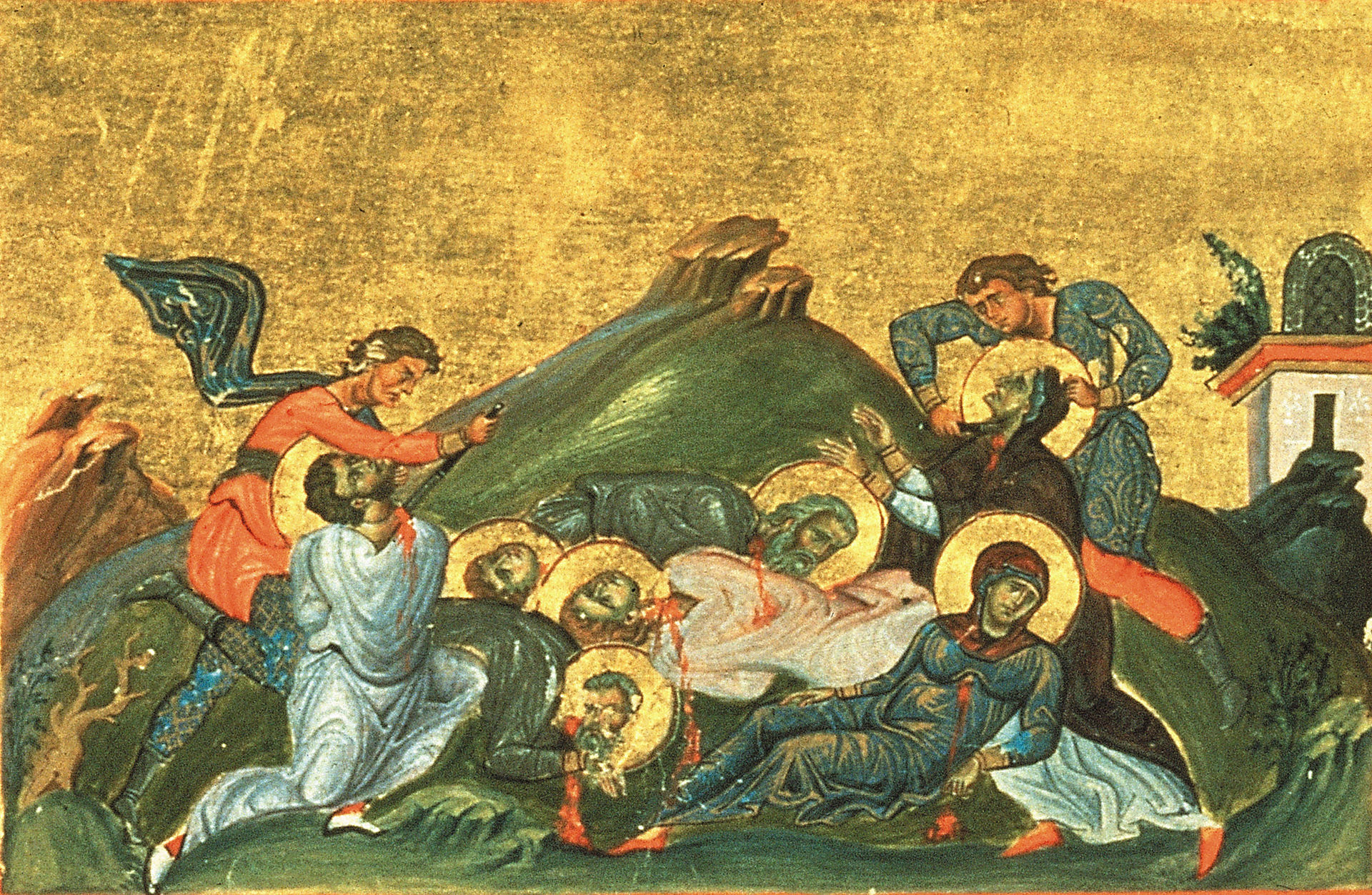
Perpetua and Felicitas – Two Martyred Mothers
Perpetua and Felicitas – Two Martyred Mothers
In A.D. 202, Emperor Septimius Severus tightened his measures against Christians who refused to pay homage to the imperial genius, the spirit of the emperor. Compliance required a minimal effort: a simple sprinkling of a few grains of incense on a brazier before an imperial image. Those who conformed received a certificate that protected them from harassment. For many Christians, that was not an option.
It was not an option for Vibia Perpetua, a 22-year-old noblewoman and mother of a nursing child. In the winter of 203, she was arrested with other Christians, including four new converts who, like her, had been catechized in preparation for baptism. Among these were two of Perpetua’s brothers and an enslaved young woman named Felicitas, who was eight-months pregnant. The new converts were baptized while in prison.
They lived in Theourba, a small town about 30 miles from Carthage – one of the greatest centers of early Christianity (home of Cyprian and of the Scillian Martyrs). They were taken to Carthage to be tried, and were eventually executed in the city’s amphitheater, one of the largest in North Africa.
What sets the story of Perpetua and Felicitas apart from those of other martyrs of their time was the fact that they were both mothers and that Perpetua wrote a diary – one of the first documents ever written by a Christian woman. (Perpetua’s brother Saturus wrote a diary as well, making this persecution one of the best documented).
Felicitas
Since Roman laws prevented executions of pregnant mothers, Felicitas was faced with the prospect of waiting in prison until she gave birth. Wanting to die together with the other Christians, two days before the date of the execution she prayed with the others for a speedy delivery. The contractions started soon after that, and she and gave birth to a baby girl who was then raised by one of her sisters.
Felicitas suffered much under labor. Her pain was so evident that a guard: “You who are in such suffering now, what will you do when you are thrown to the beasts?”
“Now it is I that suffer what I suffer,” she replied; “but then there will be another in me, who will suffer for me, because I also am about to suffer for Him.”[1]
Perpetua
We know more about Perpetua, thanks to her diary. Soon after her arrest, she was held in a private house – a normal procedure for those awaiting judgment. Later, she was moved to a dark and grim prison. “I was very much afraid because I had never felt such darkness. O terrible day! O the fierce heat of the shock of the soldiery, because of the crowds!” On top of it, she said, “I was very unusually distressed by my anxiety for my infant.” Besides, her nursing breasts must have been in pain.
She received some relief when two deacons, Tertius and Pomponius, paid some guards to allow Perpetua to move to a better part of the prison where her mother was able to bring her hungry baby. Through a special concession, the baby was left with her throughout most of her imprisonment. “I grew strong and was relieved from distress and anxiety about my infant,” she said; “and the dungeon became to me as it were a palace, so that I preferred being there to being elsewhere.”[2]
One wonders how the deacons were able to visit the prisoners (and bribe the guards) without being arrested. It could be that, in their zeal, this group of young Christians had been particularly defiant in their refusal to burn incense to the emperor. As many Christians at that time, they were looking forward to their martyrdom as to a new birth.
A Father’s Pain
Perpetua’s father tried his hardest to convince Perpetua to confess that she had made a mistake and to burn the prescribed incense, saving her life. The following scene is well-known.
“‘Father,’ said I, ‘do you see, let us say, this vessel lying here to be a little pitcher, or something else?’ And he said, ‘I see it to be so.’ And I replied to him, ‘Can it be called by any other name than what it is?’ And he said, ‘No.’ ‘Neither can I call myself anything else than what I am, a Christian.’ Then my father, provoked at this saying, threw himself upon me, as if he would tear my eyes out.”[3]
The father left, but returned a few days later, “worn out with anxiety.” “Have pity my daughter, on my grey hairs,” he said. “Have pity on your father, if I am worthy to be called a father by you. If with these hands I have brought you up to this flower of your age, if I have preferred you to all your brothers, do not deliver me up to the scorn of men. Have regard to your brothers, have regard to your mother and your aunt, have regard to your son, who will not be able to live after you. Lay aside your courage, and do not bring us all to destruction; for none of us will speak in freedom if you should suffer anything.”[4]
His concern for his family was not unfounded, as the relatives of condemned Christians were often suspected of being sympathizers.
The father continued his begging in front of the Roman procurator, Hilarianus, where Perpetua taken to be tried. He even held out her son, pleading her to change her mind for his sake. Some have wondered if he had gone to such lengths to show his loyalty to Rome. If so, it didn’t work, because Hilarianus ordered that he be beaten with a rod.
Perpetua’s determination didn’t imply a lack of feelings for her family. “My father’s misfortune grieved me as if I myself had been beaten,” she wrote.
Hilarianus addressed Perpetua only twice: first, to convince her to take pity on her father and baby and sacrifice to the emperor. When she refused, he asked her, “Are you a Christian?” Her affirmative answer sealed her conviction. She, along with the others, would be exposed to wild beasts on March 7, to commemorate the birthday of the emperor’s son, Geta. “We went down cheerfully to the dungeon,”[5] she said.
Perpetua’s Visions
While she awaited her martyrdom, she had a series of encouraging dreams and visions. In one, she was taken to fight against an Egyptian gladiator. At first, she was surprised, as she expected to be sent to the beasts, but in the arena, she turned into a man and fought with all her might. “[The Egyptian] sought to lay hold of my feet, while I struck at his face with my heels; and I was lifted up in the air, and began thus to thrust at him as if spurning the earth. But when I saw that there was some delay, I joined my hands so as to twine my fingers with one another; and I took hold upon his head, and he fell on his face, and I trod upon his head.”[6]
Her diary ended with this victory, which she took as a sign that she “was not to fight with beasts, but against the devil,” and that she would win. She then ends her diary by saying: “This, so far, I have completed several days before the exhibition; but what passed at the exhibition itself let who will write.”
Perpetua’s Legacy
And one of her contemporaries did write, adding a preface and a commentary to her diary. Two of the Christian men, the writer said, were mangled by a bear and another by a leopard. The women were given to an angry heifer, chosen because she was a female. Later, gladiator brought the mauled Christians to their death. In fact, Perpetua guided his hand to her throat, speeding up the process. All this, under the eager watch of a blood-thirsty crowd.
Perpetua’s diary and the concluding account were copied over and over and she and Felicitas were held up as model for many Christians – so much that Augustine, writing two centuries later, mentioned their story four times in his sermons.
Today, readers are still moved by the sincerity, force, and candor of her words – attributes which lack in most hagiographies. Far from depicting herself as a heroine, Perpetua relates her troubling questions, reactions, fragility, and conflicted feelings with an honesty that make her words particularly relatable and her resolution all the more valiant. Focusing on her desire to keep the faith until the end, she had no room for resentment, anger, or spite.
Perpetua’s diary also helps us to understand the eagerness for martyrdom many early Christians felt. Her words, and those of her companions, echo the words of Ignatius of Antioch who, a few decades earlier, told the Christians in Rome not to prevent his execution: “Pardon me, brethren: do not hinder me from living [the true life], do not wish to keep me in a state of death; and while I desire to belong to God, do not give me over to the world.”[7]
It’s a sentiment that is largely alien to Christians today. While we might not desire martyrdom, however, we can still draw from this a valuable reflection on what should be our true priorities.
[1] The Martyrdom Of Perpetua And Felicitas, transl. by Rev. R. E. Wallis, V.2, https://www.amyrachelpeterson.com/Groups/1000004968/Read_Perpetuas_Prison.aspx
[2] Ibid, I.2
[3] Ibid., I.2
[4] Ibid., II.1
[5] Ibid., II.2
[6] Ibid., III.2
[7] The Epistle of Ignatius to the Romans, chpt. 6, https://www.newadvent.org/fathers/0107.htm

























